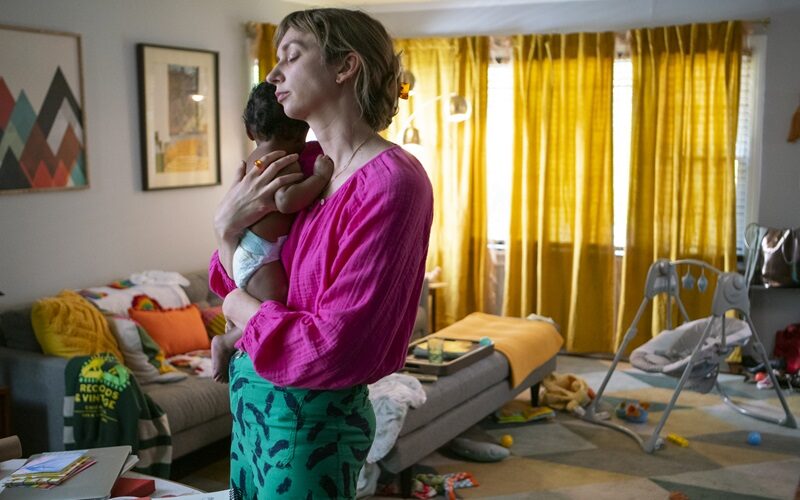Another Happy Day (Fiffer, 2023)
I almost turned it off after thirty minutes. I am glad I didn’t.
The irony of that response isn’t lost on me. Another Happy Day is about post-partum depression, and one of the unfortunate things the film drives home is that even today we do not understand it or respond to it in the same way we might respond to other forms of depression. I found myself irritated at the film and the character (Joanna) for being too static, too stuck in a descriptive mode of storytelling.. Unconsciously, I was doing what Joanna’s friends and family were doing, even while rolling my eyes a little at the film for exaggerating the indifference to Joanna’s suffering in order to score cheap sympathy points.
And honestly, if all the film did (or was trying to do) was say, “Hey, depression sucks, and look at how the rest of the world makes it worse,” I would not have appreciated it as much as I did.
The seminal narrative about postpartum, for my money, is Charlotte Perkins Gilman’s “The Yellow Wallpaper,” and one thing that made me want to watch Another Happy Day is that I was scheduled to teach that story (for the umpteenth time) to a class of undergraduates. I’ve been surprised recently how student responses to Gilman’s story have changed over the years. A majority still feel (or express) horror at the ways an oppressive, patriarchal society both trigger and deepen the narrator’s distress. But a surprising number of students in recent years have been reluctant to concede that this is what the story is about. Had the story lost some of its impact because the experience of women being infantalized, ignored, and condescended to when struggling with pregnancy complications (or any mental illness) had become less severe? I didn’t think so, but…I was interested in a contemporary take on the same subject.
One important point that I think Another Happy Day makes is that one’s domestic or social situation need not be horrific for depression to be devastating in its impact. Depression makes us sensitive to criticism, and obvious concerns from Joanna’s husband or well-meaning suggestions from glib comforters need not be as over-the-top as those of a Nineteenth Century society in order to be felt deeply by one who is suffering.
Another point is that while society may have become better at toning down its most overt criticisms of new mothers, it has not really made wholesale changes to anticipate and address how incredibly difficult giving birth can be — physically, mentally, socially, and, yes, emotionally. The back half of Another Happy Day shows how Joanna copes with and manages her depression, and while it is more uplifting than the first act, it avoids presenting her solutions as…well, solutions. There are things she does that catalyze change, but they are effective because she does them for other reasons than alleviating her own suffering. In focusing on the pain of others, she does make connections that make her feel less lonely in the long run, but–and I can’t emphasize this enough–those effects are hardly immediate and not without tremendous cost to one whose emotional, social, and mental resources are already strained.
Perhaps the thing I liked best about Another Happy Day was that it managed to honor Joanna’s work and acknowledge her suffering without demonizing everyone around her (which is too often the lazy way to induce sympathy). The one place where I felt like writer/director Nora Fiffer slipped into political soapboxing rather than personal testimony was in an exchange between Joanna and her former employer. But even here, the former employer is portrayed less as an interpersonal monster and more as the product of a system that requires her not to care about employees’ mental health and or the long-term benefits to society that might come at the cost of short-term profits.
As the story evolves, it becomes less exclusively focused on Joanna and more on her relationship with another woman suffering from depression for different reasons. This is a gutsy choice on Fiffer’s part, but it pays dividends since the audience is invited to contemplate the ways in which the characters’ situations are different. Consequently, the narratve’s scope expands and the film suggests truths worth hearing about how we overlook not just the problems of new mothers but of women in a variety of rules and at different stages of their lives.


Thanks for this, Ken. A very thoughtful look at this film and consideration of the issues involved.
Looking forward the getting familiar with The Yellow Wallpaper.